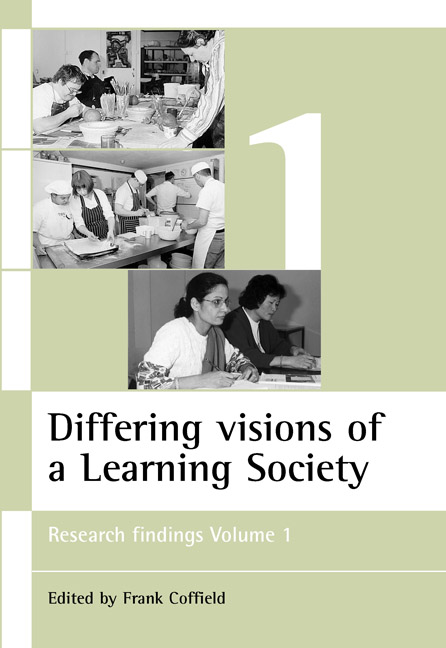Book contents
- Frontmatter
- Contents
- Notes on contributors
- Introduction: A critical analysis of the concept of a learning society
- one ‘Worlds apart’ – Education markets in the post-16 sector of one urban locale 1995-98
- two Unifying academic and vocational learning in England, Wales and Scotland
- three Skill development in higher education and employment
- four The variable contribution of guidance services in different types of learning societies
- five Changing patterns of training provision in the National Health Service: an overview
- six Working and learning in Britain and Germany: findings of a regional study
- seven Development of knowledge and skills at work
- Index
one - ‘Worlds apart’ – Education markets in the post-16 sector of one urban locale 1995-98
Published online by Cambridge University Press: 05 July 2022
- Frontmatter
- Contents
- Notes on contributors
- Introduction: A critical analysis of the concept of a learning society
- one ‘Worlds apart’ – Education markets in the post-16 sector of one urban locale 1995-98
- two Unifying academic and vocational learning in England, Wales and Scotland
- three Skill development in higher education and employment
- four The variable contribution of guidance services in different types of learning societies
- five Changing patterns of training provision in the National Health Service: an overview
- six Working and learning in Britain and Germany: findings of a regional study
- seven Development of knowledge and skills at work
- Index
Summary
Background
The background to our study is complex and multifaceted. Three contexts of change which frame the setting examined need to be noted here. They are highly interrelated:
• economic and labour market changes;
• policy responses;
• the reform of post-compulsory education and training.
The most general aspect of all this relates to the rapid change in the UK's internal labour market and competitive position within the world economy during the 1970s and 1980s. That is, the massive decline in manufacturing capacity and traditional working-class employment opportunities and the more recent expansion of a very different kind of leisure and service industry employment. In particular the transformation of post-compulsory education and training over the past 20 years is tightly tied to increases in youth unemployment on the one hand, and to the rhetorics and politics of the ‘skills revolution’ on the other. In 1960 the rate of unemployment among the under-25s was 2.4%; by 1981 it had reached 21.4%; in 1993 it stood at 17.5% (Coles, 1995). But these latter figures exclude those on training or employment schemes. In our research locale, jobs for 16-year-old school leavers are currently few and far between and mostly low-paid retail or service positions (see Skilbeck et al, 1994). “If you haven't got an education, it isn't very good because there aren't many jobs around. So you need to stay in education” (James, Year 11 student). By the time they were 17, 11% of our research cohort were unemployed (the employment status of another three, 5%, was unknown to us), compared with 21.3% nationally (in 1995) and 14% were in employment (no national figures); 51% were in full-time education, compared with 59.3% nationally.
This local lack of labour market opportunities at the age of 16 is crucially important in understanding the ‘choices’ of young people in our research locale. For some the limited employment prospects at 16 is a definite spur to ‘get qualifications’ (as James indicates). For others, as we shall see, a used-up or impoverished learning identity drives them to seek work and approximately half of this group were unemployed at any time. Decision making at 16 is, in part at least, a response to a social context of uncertainties. Many working-class young people in particular find themselves in a liminal state; “one without a defined status or future in the world of work” (Bettis, 1996, p 106).
- Type
- Chapter
- Information
- Differing visions of a Learning Society Vol 1Research Findings, pp. 39 - 70Publisher: Bristol University PressPrint publication year: 2000



